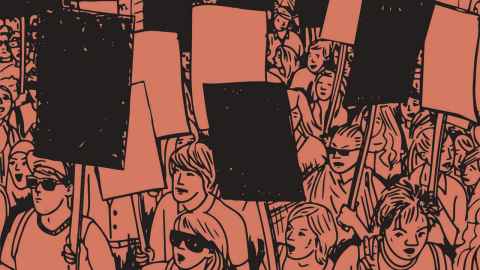Taking Issue: Do protests work?
4 November 2025
Opinion: Are protests an effective means to bring about change? Ingenio asks six academics if collectively taking to the streets with placards in hand still works.

There is proof of the power of protest to unnerve errant governments.
Brent Burmeister: When our right to protest is lost, we will know the difference
Protest works, even now – especially now. Democratic disengagement is a top-down process. It’s evident in the coalition government’s prioritisation of easy money over sustainable economic development; in its treatment of workers as insolent serfs; and in recent revelations of concealed ministerial preparations to crush pay equity claims. It is even more obvious in the American context, where the forces of ultra-conservatism have spent five decades undermining democratic institutions.
When our leaders abandon democracy, democracy rallies in protest. Here, and wherever governments waver on political pluralism, the public expression of dissent grows louder. It comes in response to threats to our natural environment, to the place of tangata whenua in our society, to equality in the workplace, to the rights of labour, and on a host of other issues about which our government has gone deaf to public opinion. Meanwhile, Trump’s cruel kleptocracy has provoked millions of ordinary Americans into the streets to demand an end to his defiance of democratic norms.
Is it effective, though? Trump continues to ride roughshod over political proprieties, causing untold damage at home and abroad. And here? The revival of oil exploration and mining in our vulnerable environments. Our long-fought pay equity claims immobilised. Kaimahi seek recognition of their contribution to society and are answered with reproaches. The Regulatory Standards Bill, that insists all should be treated as legal equals to ensure real inequalities go uncorrected, will win parliamentary support. The shouting and marching don’t seem to have made much difference.
But there is proof of the power of protest to unnerve errant governments. Around the world, such regimes start stripping citizens of their right to protest – in the interests of security, of course. It is unsurprising that the coalition is planning changes to the Terrorism Suppression Act that would make it harder to voice support for causes that can be tied to banned organisations. The over-reach this allows is already manifest in the UK.
If it makes no difference, why not let the rabble raise its voice? When our right to gather in public to express dissent is lost, we will know the difference it made. Protest works.
Brent Burmeister is co-president (academic) of the University of Auckland Branch Committee of Te Hautū Kahurangi Tertiary Education Union and a senior lecturer in the Department of Management and International Business.
Campaigners used words like ‘joy’, ‘empowered’, ‘bulletproof’ and ‘resilient’ to describe how protest actions made them feel.
Carisa Showden: Hope stems from communities taking action
When asked if protests are still effective, my first responses are “of course!” and also “what do we mean by effective?”
Protests always have multiple goals. One of the most important is to give activists and supporters hope. When filling the streets with others who are chanting and singing, bringing their best and snarkiest signs, hooting and hollering, people feel energised. When my research team and I were working with Aotearoa-based activists, campaigners used words like ‘joy’, ‘empowered’, ‘bulletproof’ and ‘resilient’ to describe how protest actions made them feel.
We know from overseas studies, too, that these kinds of actions are essential for keeping hope alive when facing down existential threats like colonialism, climate change and authoritarianism.
One reason for this positive effect is because protests are often heaps of fun, and fun is a good antidote to the heaviness of the challenges we’re facing.
Another reason is that hopefulness also stems from the feeling of community that comes through taking action with others. Being with people who care about the same things we do reminds us that we’re not alone in this work. These actions sustain activists through hard times, including when politicians are dismissive or slow to respond.
Protests have only ever been one tool in the activist toolkit. Most people don’t expect that marches will be the one thing that flips parliamentarians’ votes or moves the dial in a big way on public opinion. But these events do raise awareness about issues and let both the public and government officials know that citizens are watching and they care. Protests are also great for getting media attention, and an effective protest is one that gets good headlines. Plus, you might even recruit a few new supporters to the cause.
Rage Against the Regime, Hīkoi mō te Tiriti, No Kings!, Fridays for Future – there’s a reason protests are becoming more, not less, frequent. When people feel threatened or see mass injustices taking place, they seek each other out. Protests are very effective at providing support, joy, fun and a sense of possibility. There is hope in taking action!
Carisa Showden is an associate professor of sociology in the School of Social Sciences and one of the authors of Fierce Hope: Youth Activism in Aotearoa.
We need to fight the urge to simply bolster our identities – whatever
they may be – and advocate for actual change.

Danny Osborne: Beware of 'slacktivism'
From the #MeToo and Black Lives Matter movements to the growing response to what I and many others consider an ongoing genocide in Gaza, people are increasingly taking to the streets to protest.
But do protests actually work? The short answer is, yes. But like most answers, there is an elephant-sized asterisk next to that affirmative.
Indeed, there are countless nuances to consider when examining the effectiveness of a protest. Does the protest aim to change public policy? Or is it to raise awareness of an issue? Or do the protesters simply want to solidify their identity? How one answers the question depends on what we mean by ‘work’.
If the goal is to change public policy, then we need an expanded timeframe to give protests the chance to ‘work’. Rarely does a single protest change public policy immediately. For example, the Civil Rights Movement in the US – the epitome of an effective movement – began decades before the Voting Rights Act sought to end racial discrimination in voting.
Environmental activists have likewise pushed for climate-friendly policies for decades. Although public policy has yet to fully embrace the goals of the movement, the public has become increasingly aware of the perils of climate change. As such, there is a palpable feeling that change is on the horizon – as long as we stick to it and continue to hold our public officials to account.
Although social media has the potential to increase the success of protests by reaching many people, there is a growing awareness of its drawback: slacktivism. That is, many will ‘like’ or ‘share’ a post yet fail to contact their local MP or donate to a cause. As a result, awareness may increase, but actual change may fail to materialise.
As such, we need to fight the urge to simply bolster our identities – whatever they may be – and advocate for actual change. Given the endless challenges facing our generations, including the rising rates of inequality, the effects of climate change, and the democratic backsliding that is occurring globally, we can only hope that protests continue to ‘work’ in the long run.
Danny Osborne is an associate professor in the School of Psychology.
It is the masses alone that make history.
Emmy Rākete: Protests are a threat that promises to the masses can't be ignored
In the ten years since I helped to co-found the prison abolitionist group People Against Prisons Aotearoa (PAPA), I have organised more protests than I can remember.
A protest is a test. It is a proposition we make to the working class: are you ready to do something? Most of the time, social and ideological conditions are not yet right for a rupture to occur. Most protests are small and have little impact. But sometimes, when we ask the masses to take our hand, protests can initiate massive social change.
Can protests be said to work, then? I think this question is mistaken. In 2019, the New Zealand Police announced a trial of police armament in predominantly Māori and Pacific communities. I helped to organise PAPA’s campaign against the trial, including protests, community meetings, and a letter-writing drive. After the murder of George Floyd, our campaign went viral, decisionmakers were flooded with messages from our supporters, and the trial ended without becoming policy. So, did we do that? Of course not.
This is not to say there was no connection between our protest and the victory over police armament. The campaign won, not because we held some symbolic protests, but because we organised and directed the masses. It is the masses alone that make history. They make history because the working class is the foundation of society, from whose labour all profit is taken and on whose backs all palaces – from Petrograd to Remuera – are built. A protest is a threat: a promise that if the masses are ignored, we will come back hungrier, angrier and better organised.
Understanding protests in this way matters because the state can accommodate merely symbolic opposition. Holding some signs and then going home leaves the ruling class free to return to drilling for fossil fuels and hobnobbing with genocidaires. Protests work when they mobilise the masses for something beyond mere protest – for the threatened or actual exercise of coercive power to which the state must acquiesce or respond in kind.
Protests work because of the uprisings they are waiting to ignite.
Emmy Rākete is the press spokesperson for People Against Prisons Aotearoa and a social sciences lecturer in the Faculty of Arts and Education.
Activation is protest, coupled with a belief in what is beyond, and a
social movement towards that goal.
Eru Kapa-Kingi: Activation movements will realise systemic transformation
Do protests work? My response – no – will likely surprise most. To be clear: protests don’t work, but activations do.
My philosophy in the field of tangata whenua led change is that for something to ‘work’, it must draw a social bridge between current realities and a future of meaningful change, with dignifying realities for all peoples. My generation of te iwi Māori describe this as Hawaiki Hou (a new Hawaiki).
Protests are not designed to and therefore cannot achieve this ever-moving goal of generational change for Aotearoa. This is because protests object to what is or what is soon to be, and focus on defending against imminent threats – those threats being part-and-parcel of the overarching reality.
These threats may be socioeconomic, political, legal or all of the above, and may well be neutralised through powerful acts of protest. The work of protest is therefore integral to minimising harms to marginalised communities, but beyond that objective, the all-consuming reality remains.
Take the classic example of objecting to the unjust acquisition of Māori land. Protesting this threat may stop it from happening altogether, and is a highly necessary action for tangata whenua; tikanga Māori would indeed demand such objection. But beyond any specific outcome, does the protest action on its own unravel the legal system that permitted the theft in the first place? Kāhore (that means no in my iwi linguistics).
Activation, a new-generation term to describe organised political action, goes deeper than defence. It adds a layer to the longstanding legacy of tangata whenua resistance, by expressing a clear intent to also empower and uplift. The intent is to literally activate the imagination and conviction of society towards the idea of new, of different, of better, of mokopuna-centric change. Activation is protest, coupled with a belief in what is beyond, and a social movement towards that goal.
Protests are important, but on their own can risk perpetuating the very cycle of harm created by the overall political and legal system in the first place. Protests cannot exist in isolation. For lasting change they must be joined by activation movements that shift societal attitudes and eventually realise systemic transformation.
Eru Kapa-Kingi was a leader of the 2024 Hīkoi mō te Tiriti and is a professional teaching fellow in the Faculty of Law.
Even if protest doesn’t have an immediate impact on governments or
policies, the act of participating is vital for people challenging power.

Jennifer Frost: Knowing you are not alone can make a difference
Do protests work? Yes, protests work, but this question also asks us to consider what kinds of protest, how do they work, and for whom?
As a historian of the United States, I can find many instances of successful protests. Most famously, the Civil Rights Movement incorporated protest into a decades-long struggle against the US racial system of segregation and disenfranchisement, and ended its legal basis in the 1960s. More recently, the global School Climate Strikes have raised public awareness of climate change and the need for climate action.
These actions worked because they explicitly addressed and aligned with protestors’ aims. In both cases, social groups without political power – African Americans and young people –used protest to highlight injustices and inequalities, whether racial or generational, and reshaped political discussions and agendas to demand change.
Protest also works when it is part of a larger strategy and combined with other tactics. The US women’s suffrage movement of the early 20th century organised protest marches and picket lines alongside press publications and political lobbying. This range of tactics allowed the movement to direct its messaging to different audiences in different ways.
Such effective protest actions and political tactics are the result of careful planning and messaging, which are under the control of organisers, combined with a receptive audience and good timing, which are not. No one can know when and where protest will find an audience. The turning point often comes as a surprise and is why people continue and should continue to protest.
Even if protest doesn’t have an immediate impact on governments or policies, the act of participating is vital for people challenging power. It fosters face-to-face interaction and communication about current concerns and new ideas. It builds a sense of agency, solidarity and community. It allows for creativity in designing protest signs, images, music and chants.
Knowing you are not alone and can make a difference matters even more in our current social media age and when those in power want people divided, disengaged and disempowered. In this way, protest is an end it itself, and it always works for those who take part.
Jennifer Frost is an associate professor of history in the Faculty of Arts and Education.
A version of this article first appeared in the Spring 2025 issue of Ingenio.
The writers' views reflect personal opinions that may not be those of Waipapa Taumata Rau, University of Auckland.